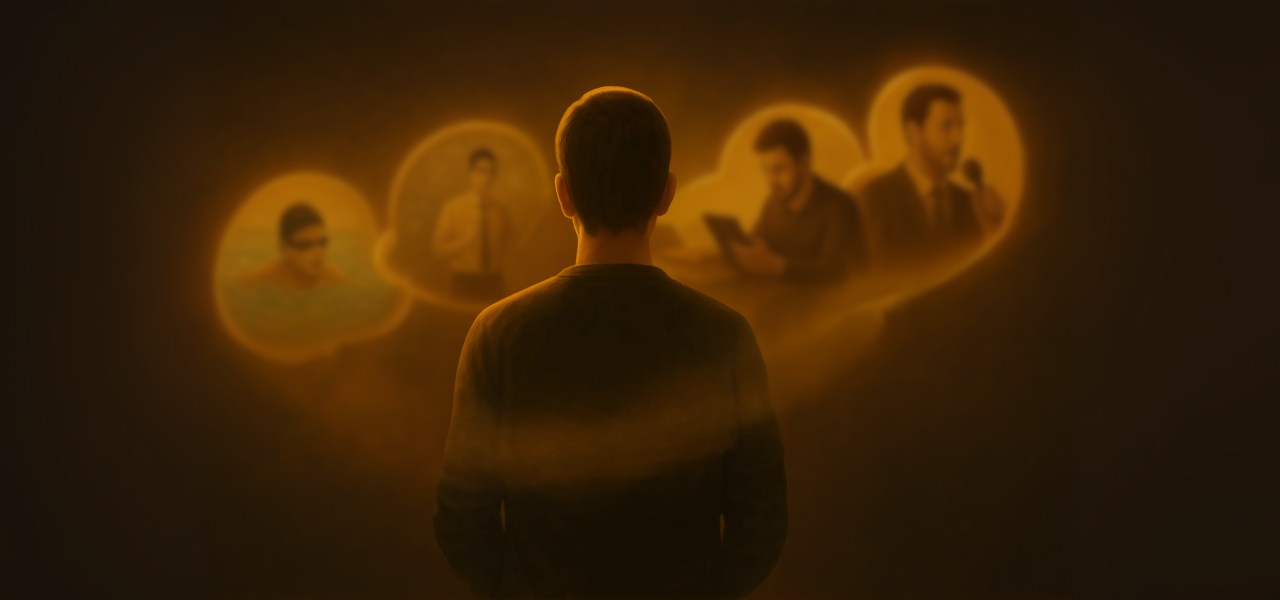The World Doesn’t See Barriers—We Build Them Ourselves
Interview with Egor, combat sports commentator and SMM specialist
On finding your calling despite a diagnosis, working in a visual industry with impaired vision, and embracing the courage to try new things.

Tell us a bit about yourself. What do you do? What’s your diagnosis, and how does it affect your vision?
I have cone-rod dystrophy. To put it simply, imagine the eye as a screen made of pixels. A healthy person has 100% of these “pixels”—light-sensitive cells—while I have only 10%. Cones are responsible for color vision, and rods for black and white.
It’s a congenital condition, and strangely, even though it’s supposed to be hereditary, no one else in my family has it. My parents spent years trying to understand what was going on and find a cure. But the disease is rare and not being actively researched today. When I was around 13 or 14, a doctor told me I’d be blind by 18.
The thing about this disease is that it either stays the same or gets worse—you can’t reverse it, just like you can’t grow a new arm. My vision has definitely worsened since childhood, but so far, I’ve proven all predictions wrong. I’m doing my best to keep it that way.
How did you get into sports and commentary?
I’ve always been into sports. As a kid, I did competitive swimming and even reached the level of Candidate for Master of Sports. My parents hoped sports would captivate me—and it did.
I also loved football, but I kept breaking my glasses. Without them, I couldn’t play, and they’d just fly off my face.
I’m trained as a math teacher—teaching runs in the family. I’m the third generation. I worked in a school for six years and now I tutor privately.
About 11 years ago, I got into wrestling. First I just watched it, then I started writing articles in fan communities. I commented on a small event for the first time—very amateur, and hopefully that recording is lost forever!
In 2019, I hit a crossroads—I almost got married at 20 and was searching for something to fully dive into. That’s when I seriously got into commentary. I built my own wrestling community, voiced videos—all still amateur.
In 2022, I found out there were independent wrestling federations in Russia. It took a year to get in—they were hard to reach. But I made it and started being seen as a pro.
About a year and a half later, the director of the TV channel “Match Fighter” reached out. I did a test show with one of their commentators. Starting in 2024, I signed a contract as a combat sports commentator.
What’s it like working in such a visually-driven field?
It’s always been important to me to make my commentary accessible to those who listen, not just watch. I want people to follow the action just by hearing me—and enjoy it.
So I never really saw my vision as a barrier. I didn’t even think about it until recently, when I started to realize the irony of working in such a visual field.
Now that this is my main job, there’s no inner conflict. I love what I do. My goal is to make it fun and engaging for the audience—to give them a good time with my voice.
Were there challenges on your path to becoming a commentator?
At my second-to-last teaching job, I had a bad experience. Modern schools rely heavily on electronic gradebooks, and those platforms aren’t accessible for people with low vision.
Teachers are expected to update grades in real time during lessons. I couldn’t—I had to do it after class. Eventually, the administration told me they’d look for a job better suited to my “capabilities.”
Experiences like that make you feel like society isn’t always ready to accept professionals with disabilities.
I started working full-time as an SMM specialist about five months ago. Some apps still lack accessibility features, but overall, I’ve faced very few issues.
In both SMM and commentary, no one has ever questioned or doubted me because of my vision. That kind of understanding is rare—and it’s amazing to experience.
What tools help you in your work?
I don’t use any special assistive tools. But I have a specific sensitivity: I can’t work with white backgrounds and black text. It causes visual stress.
So I always switch to dark mode and use larger fonts. I’ve also ditched paper altogether—black print on white paper is just too difficult to read.
To others, it may look odd that I work almost entirely on a tablet and phone. But that’s how I access everything—scripts, research, communication—it’s all on those two devices.
Have people supported you along the way?
Absolutely. My colleagues are incredible. Even though I work in a visual field, when I disclose my vision, no one ever treats it as a problem.
One co-commentator, who often works night shifts with me, noticed I struggle with stairs in the dark. Now, every single time—day or night—he warns me about steps. That kind of thoughtfulness means a lot.
I’ve never experienced discrimination in this field.
How do you describe the dynamics of a fight in a way that captures the action for the listener?
I’m very expressive. Some commentators lean on deep technical knowledge—and that’s valuable. But not every viewer cares about move names or technicalities.
What really matters is building suspense and keeping people hooked from start to finish. For me, emotion is the foundation—though of course, facts and context are important too.
Do you have favorite phrases or signature calls to build the atmosphere?
Some commentators do have catchphrases. In our field, a line from Roman Mazurov is popular: “People who come into combat sports are people who get paid to hit others.” Simple, but memorable.
I don’t really have a signature phrase myself. I adapt my style based on who I’m working with. Every co-commentator is different, and I love finding the right dynamic with each one.
How do you train your hearing and focus?
I think many people with visual impairments develop heightened hearing. I’ve always had excellent auditory perception.
I have a weird skill: in total darkness, I can clap my hands and tell how close a large object is—like a wall or piece of furniture—just by the echo. I can even guess where it is.
As a kid, I told my mom, “I’m a dolphin! I can hear the walls!” It’s like real-life echolocation—and it’s awesome.
What inspires you in your work?
A lot of fighters have powerful backstories—many come from tough backgrounds and rise through hardship. People often see combat sports as pure aggression, but to me it’s about passion and perseverance. Watching someone grow—that’s inspiring.
When I worked with wrestling, I noticed many fans were people with various disabilities—not just vision. That really touched me.
Knowing that my work brings someone joy—whether they’re at home, alone, or just looking for something uplifting—that’s priceless. It’s never been about the money for me. Of course, I want to grow professionally, but making someone happy with my voice—that’s the real reward.
How do you balance work and personal life?
Work definitely dominates. I can easily work 18 hours a day—it’s just how I am. But I do try to switch things up and unwind, or I burn out fast.
I used to be really into tabletop games, especially D&D. Now I have less time, but I still make space to relax.
My girlfriend gets a bit sad sometimes—my work is mostly on weekends, which is when she’s off. But she’s been incredibly supportive. We’ve been together for four years, and she’s always believed in me. She knew about my vision issues from the start, but that never scared her away. Having someone who truly believes in you is everything.
What would you say to people with vision impairments who want to start something but feel afraid?
The biggest barrier we face is often our own self-doubt. The world isn’t always friendly—but there are still tons of opportunities. You just have to take that first step.
In 2019, I spent months debating whether to start a blog. I kept thinking, “Who’d care about my opinions? What if they notice my vision?”
Eventually, I grabbed a camera, recorded a monologue, and that was the beginning of my journey as a commentator. I’ve never regretted that moment.
Never build walls around yourself. Just try. You don’t know what you’re capable of until you start. And it’ll hurt a lot more if you don’t try at all.
